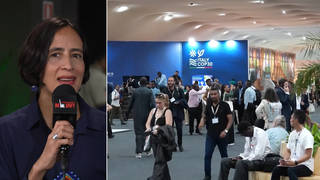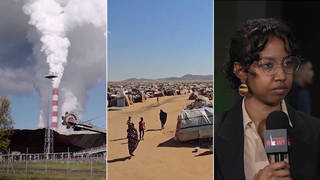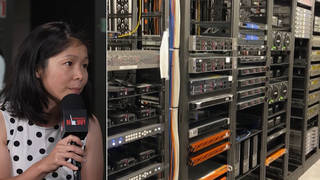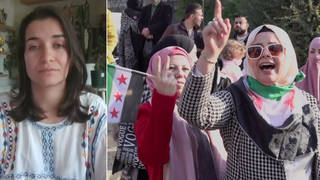
Scores of protesters have been killed in Syria during 10 days of protests against the rule of President Bashar al-Assad. In an attempt to appease protesters, Assad’s administration has reportedly vowed to lift the emergency law, which for nearly 50 years has allowed the government to detain people without charge. “For more than 40 years, people have been politically suppressed,” says Bassam Haddad, the director of the Middle East Studies Program at George Mason University. “That suppression was coupled more recently in the past 20-some years with neoliberal-like economic policies that have created huge gaps between different segments of Syrian society.” [includes rush transcript]
Transcript
AMY GOODMAN: Dozens of people have been killed in Syria during the last 10 days of protests against the rule of President Bashar al-Assad. According to Human Rights Watch, 61 deaths have occurred in the southern city of Daraa alone, 12 people killed Saturday during protests in the coastal city of Latakia, at least 200 people hurt.
In an attempt to placate protesters, Assad’s administration has vowed to lift the emergency law, which for 50 years has allowed the government to detain people without charge. President Assad is expected to address the nation Tuesday. The U.S. government has been increasingly critical of the Syrian regime.
JAY CARNEY: We strongly condemn the Syrian government’s attempts to repress and intimidate demonstrators, and we are calling for an immediate cease to the violence and killings of civilians at the hands of the Syrian security forces. It’s the same position we’ve taken throughout the region, and we condemn it strongly.
AMY GOODMAN: That was Jay Carney, White House spokesperson, speaking last Friday.
In an interview yesterday, Senator Joe Lieberman, the chair of the Senate Homeland Security Committee, suggested he would support military intervention in Syria if its president uses the same violent tactics as Muammar Gaddafi in Libya. He was speaking on Fox News. Senator Lieberman said, “There’s a precedent now that the world community has set in Libya, and it’s the right one. We’re not going to stand by and allow this Assad to slaughter his people like his father did years ago, and in doing so we’re being consistent with our American values and we’re also on the side of the Arab people who want a better chance for a decent life,” Lieberman said.
Well, to discuss the events in Syria, we’re joined by Bassam Haddad, the director of the Middle East Studies Program at George Mason University. His book is called Business Networks in Syria: The Political Economy of Authoritarian Resilience. It will be out later this year.
Welcome to Democracy Now! Talk about the latest crackdown in Syria.
BASSAM HADDAD: Thanks, Amy, for having me.
Well, we have a situation where the regime is getting quite nervous about these protests, and they are fearing that they would spread to the inner cities, the big inner cities or the big cities like Damascus and Aleppo. So far, they’ve been concentrated in the periphery or in the countryside, if you will, in some areas. And it’s very important for us to pay attention to this distinction, because it does seem that Syria is split, not between the pro- and the anti-regime, but between the anti-regime protesters and those who are on the sidelines, who have argued several times that “we’ll continue to be on the sidelines or we’ll not go to the streets, so long as the level of violence and brutality does not pass a certain threshold.” And as problematic as, and perhaps criminal, as we’ve seen the situation became in Daraa and elsewhere, it hasn’t yet passed this threshold.
And the regime has an opportunity to scale back the violence, but things can spin easily out of control if a certain set of factors basically unfold. But this is a very tense situation, and I regret some of the statements made regarding international or military intervention by people who have supported for many years and decades both dictators and ethnic cleansing in Palestine, and now all of a sudden they have developed a determination to create these kinds of problematic policies.
AMY GOODMAN: Talk about the demands of the protesters in Daraa and other places throughout Syria, Professor Haddad.
BASSAM HADDAD: The situation in Syria is much like most other Arab countries. For more than 40 years, people have been politically suppressed. That suppression was coupled more recently in the past 20-some years with neoliberal-like economic policies that have created huge gaps between different segments of Syrian society. More than 250,000 people go into the job market yearly to find basically nothing or very little by way of being able to survive and maintain their dignity. And finally, there is no — or there are no avenues for redress in Syria, so you have an accumulation of political and economic problems that have hit at least 70 percent of Syrian society.
And then the trigger recently has been the events in Egypt — Tunisia and Egypt, which actually have put forth an example and model that I think many of the protesters in Syria are following, except that Syria is indeed — like many other countries are different from others, but Syria is indeed different from Tunisia and Egypt, in various respects. So, we can talk about these, but I’m not sure what you want to focus on.
AMY GOODMAN: Well, let me just raise the issue of one of the Americans who was detained in Syria. On Friday, Syrian officials detained an Egyptian American engineer named Mohamed Radwan after accusing him of spying for Israel. State television aired what it called a confession by Radwan, in which he says he visited Israel in secret and took money in exchange for providing photographs and video about Syria. Radwan’s family members dismiss the accusations as a lie. They’ve sought help from the Egyptian ambassador to Syria and the U.S. embassy in Egypt, but say there’s no word yet on whether he’ll be released. Democracy Now!’s Sharif Abdel Kouddous spoke to Radwan back on February 1st, when he was in Egypt participating in the first day of the first million people march on Cairo’s Tahrir Square.
MOHAMED RADWAN: OK, my name is Mohamed Radwan. My family is from Cairo, Egypt. I’ve been living abroad for many years, and now I’m living in Damascus, Syria. And I got here Friday morning. I woke up, read the news, and I realized Friday there’s going to be a lot of, well, activity, and I don’t want to miss out on that, so I went and got a ticket. And I got here Friday morning and — to join the events on Friday afternoon.
I lived in the States. And, you know, there’s a lot of political awareness since 2001 or 2002, when the war started and everything. Back then, before, pre-2001, there wasn’t too much thought about the political — anyone’s political identity. Well, here, people are always politically aware. They always have a political opinion. But everyone was so jaded. And seeing this, all of a sudden everyone is politically charged. Everyone’s got an opinion. Everyone wants to see change.
AMY GOODMAN: That was Mohamed Radwan speaking to our own Sharif Abdel Kouddous in February in Cairo’s Tahrir Square. Syrian officials detained him while he was working in Syria.
Another American, Pathik Root, is also in Syrian custody. Root’s father said Vermont Senator Patrick Leahy called him Saturday to tell him the Syrian ambassador in Washington, D.C. confirmed that his son is detained, unclear why or when he will be released.
Can you talk about these young men and those who are being detained, how many you understand have been detained and perhaps tortured, not clear?
BASSAM HADDAD: Well, I am not exactly sure about these numbers. I have read about these — some of these incidents in the news, but I do not have details beyond what you have already put forth. I think that we are certainly likely to find out that more and more people will be detained in this manner, and perhaps many do represent authentic problematic individuals, but also others will be detained on false pretense, as we have seen in the past.
AMY GOODMAN: A while ago, a few weeks ago, Professor Haddad, you wrote a piece called “Why Syria Is Not Next…So Far” and “Syria is not Egypt.” Very briefly, can you talk about why?
BASSAM HADDAD: Well, the piece first appeared in the Carnegie Reform Bulletin, and it was titled “Why Is Syria Not Likely to Be Next,” as in the next regime to fall, not that Syria is not likely to have these protests.
The difference between Syria and Egypt and Tunisia are several. But this does not mean that things cannot spin out of control to produce the same effect. But structurally speaking, the Syrian society is far more heterogeneous and divided than either the Egyptian or the Tunisian societies, on the one hand. So the opposition is not cohesive. There are various groups that hail from different regional and communal background who don’t necessarily see eye to eye. They will come together in the event of excessive brutal repression that will go beyond what we have seen already, but until then, it’s very difficult for us to imagine that there will be a Tahrir Square showing like we’ve seen earlier.
On the side of the regime, the Syrian regime, as opposed to the Egyptian and the Tunisian regimes, are — the Syrian regime is far more consolidated at the top, in terms of the party, the army, security services and the top leadership. So that cohesion cancels out some of the options that were taken in both areas, in both other cases, where the army had to step in and make decisions. There’s no such thing in Syria. There is no possibility of Bashar or anybody in the top leadership leaving Syria to avert crisis. This is simply not an option, except that we can also say that we have heard rumors recently — and they’re only rumors — that there is some schism at the top, which may have explained the hot and cold responses by the regime: the reforms and then the repression.
I do not wish to dwell on these rumors about what has been happening at the top, because they’ve been circulating for years, and I’m sure they might have some legitimacy to them, but I think it’s best — it’s better for us to focus on what happens in major cities like Damascus and Aleppo, because when the tension and the escalation gets out of hand in those cities, on the streets of those cities, this is when we begin to — we should probably start thinking about a different outcome or different scenario. But so far, the main cities have been calm.
And there’s been some support for Bashar throughout the country. The support is by no means reflecting of a majoritarian support at all, but it is something that also distinguishes Syria from the other countries, including the fact that Bashar has been in power for only 10 years as opposed to the 24 and 30 and 40 in the other countries, and he is not associated as much with the atrocities of the Syrian regime in the 1980s.
AMY GOODMAN: Professor Haddad, we have to leave it there. I thank you very much for being with us, of George Mason University.












Media Options